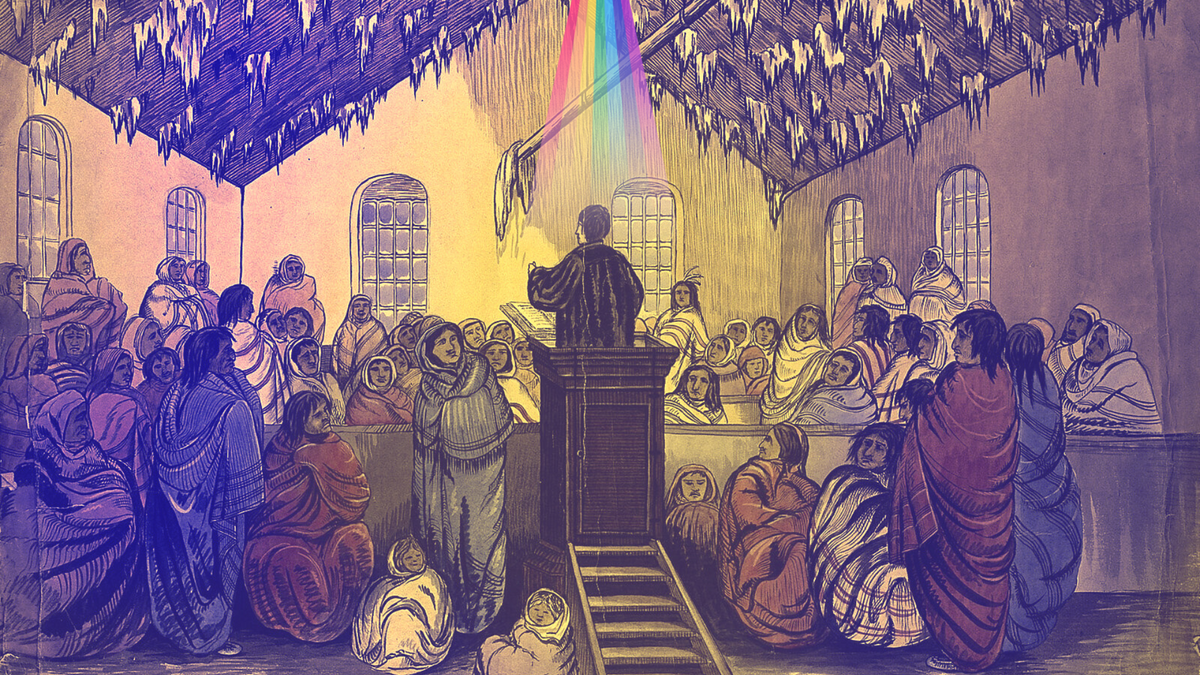Stonewall: The New Missionaries
The LGBTQ+ organization continues the tradition of foreign religious dissemination in India.

Originally founded in London in 1989 to advocate for, and advance the rights of LGB people, Stonewall shifted its remit to focus primarily on transgender issues in 2015. Stonewall now has a concerted global outreach, including dedicated partnerships with Indian organizations: Keshav Suri Foundation, Pride Circle, and the Federation of Indian Chambers of Commerce & Industry (FICCI).
Together with these organizations, Stonewall produced its first Indian Workplace Equality Index pamphlet in 2020. This document intends “to navigate the challenges of embedding LGBT+ inclusion” in the Indian workplace. In doing so, Stonewall alludes to an asymmetry of doctrine and seeks to rectify these differences by transposing their values onto employers in India. So confident are Stonewall in their moral conviction, they declare: “We make sure that the world hears and learns from our communities…” The notion of moral impetus driving the proliferation of an ideology globally is overwhelmingly familiar, not least in India where missionaries have operated for centuries.
Missionaries: a rich tradition
Stonewall, the new missionaries, continue a surprisingly old tradition of foreign religious dissemination in India. St. Thomas can be considered the first Christian Missionary to spread the Gospel to native Indians when he set foot in Kerala, establishing 7 churches in 52 AD.
Historians speculate that it was perhaps not only a vocation to spread the Gospel, but the diverse, rich trading center of Kerala which drew this Palestinian Jew of the Roman Empire to Indian shores. Likewise, Stonewall’s expansion into India can be viewed as more than pure altruism borne of faith.
India is an emerging market for elective cosmetic surgeries and government initiatives to fund “trans healthcare” have been rolled out. The Transgender Persons (Protection of Rights) Act of 2019 has ensured that Indian employers are “ripe” for the picking. It is notable that Stonewall’s recent foray into new territory comes in the form of the “India Workplace Equality Index.” Furthermore, they celebrate The Federation of Indian Chambers of Commerce & Industry (FICCI) as their “Industry Partner.” On the face of it, Stonewall maintains on its website that it is free to submit to the Index, however mission and money are inextricable. As Naomi Cunningham of Legal Feminist points out, in submitting to the index:
- You pay for lots of Stonewall training.
- You pay for membership of a scheme that wins you the privilege of being – by turns – patronizingly congratulated and sanctimoniously nagged about how well you’ve absorbed and implemented that training.
Cunningham’s use of the word “patronizingly” is perfectly apt. Indeed, the language on their website and their “Gold, Silver, and Bronze” award scheme for example, while appearing kind or helpful, betrays a feeling of superiority. The phrase popularized by Rudyard Kipling, “The White Man’s Burden” comes to mind. The poem expresses a sense of duty asserted by white people to manage the affairs of perceived lesser developed brown people.
The White Man’s Burden
In his ode to British Imperialism, Kipling offers the lines, “Your new-caught sullen peoples, half-devil and half-child.” Within these words he reveals the European belief that non-white people (Indians, for the purpose of this essay) are immature heathens, reconciled to a life of savagery. To many European nations, Christianity represented western civilization and the basis for morality. In this sense, Christianity served as a major force in the eventual colonization of India.
The European missionaries in India proliferated the tenets of Christianity in the firm belief that they were spreading a compassionate and just doctrine. But in doing so, they showed scant regard for existing belief systems and the established society of the Indian people.
Driving Western Christian Missionaries is the belief that many Eastern cultures are under the control of “the Evil One,” and the concept of “Judgment Day.” The Bible asserts that God “has set a day in which he purposes to judge the inhabited earth” (Acts 17:31).
Different denominations have disparate views on how Judgement Day will manifest, but ultimately the general assertion is that all the dead will be resurrected, and their souls reunited with their bodies. These bodies will then be transformed: those of the wicked to a state of perpetual shame and torment, and those of the righteous to an infinite state of celestial glory. “Justification” for positive judgment is thus achieved through “faith and works.” “Good faith and works” are therefore dependent on knowledge of the word of God. No matter how good you are, if you happen to be born into the wrong theology, you are doomed to eternal damnation lest you be converted.
"India is an emerging market for elective cosmetic surgeries"
Of course, historically, missionaries performing “good works” was a successful way of marketing the faith. Although it was the Portuguese Jesuits who brought with them the printing press and first established centers for learning in Kerala; British Baptists like William Carey, arriving in Calcutta in the late 18th century, pioneered modern education in North India.
The field of medicine is another area in which Christians have made a significant contribution to common welfare in India. Again, it was the Jesuits in the 16th century who opened infirmaries, bringing European medical knowledge to the East. By the 19th century, medical establishments of various kinds had been established by missionary societies throughout India. The Christian Medical College Hospital, Ludhiana, founded by Dr. Edith Brown in 1893; and the Christian Medical College Hospital, Vellore, which began as Dr. Ida Scudder's roadside clinic in 1895, are both now internationally recognized.
Ultimately, like Christians, Stonewall are convinced of the benevolence of their ideology, believing that it will enhance the lives of Indian people. In their “Side by Side” document, “a global guide to building business and civil society partnerships for LGBTQ+ rights,” Stonewall asserts that they are led by the principle of “do no harm” when working to advance “LGBTQ+ equality.”
This particular resource makes clear the importance Stonewall places on affecting the beliefs of civil society through staff training within business institutions. Certainly, in order for trans-identifying individuals to be acknowledged as the opposite sex to that of which they were born, a sea change in prevailing societal belief systems is required.
That is to say, their self identity is dependent on the external validation of others. Ergo, it falls upon others outside of the trans community to hold up the “trans umbrella” lest the sky, rainbows and all, fall down! And so it has become Stonewall’s “Mission” to recruit more umbrella bearers to uphold and propagate the faith- “gender identity.”
The field of medicine remains a very important frontier in the marketing of faith for the new missionaries. Stonewall’s website highlights an individual called “Jigar Bhadra (he/him)” as a “changemaker” in India.
"Ultimately, like Christians, Stonewall are convinced of the benevolence of their ideology"
Jigar’s vision is to form a Pharma, Tech and consulting consortium for the LGBTQIA+ community to function not only as support group but also to exchange ideas and motivate senior leaders and board members to be vocal allies of the community. Jigar wants the medical community to focus on the healthcare needs of LGBTQIA+ community.
Emphasis on “healthcare” and influencing the values of the medical community by way of business leaders and board members has already been a successful battle ground for Stonewall and its affiliates at home and in India. In fact, the Christian Medical College, Vellore, now conducts sex reassignment surgery at no cost through non-governmental organizations.
Stonewall’s partnership with businesses has also been an astute and fruitful tactic in affecting government policy. When the Indian government moved to reinstate the ban on gay sex in 2013, large international corporations signed up to Stonewall’s “Global Diversity Champions” scheme pushed back.
IBM’s vice president and managing director of global intellectual property licensing Claudia Brind-Woody, speaking in 2014, acknowledged that “Stonewall and other NGOs can only do so much.” She went on to explain how the clout of corporate brands “allows us to have that convening power” to push forward a social justice perspective, which, she concedes, is above everything “good for business.” The campaign against the draconian laws against homosexuality was ultimately successful when the Supreme Court overturned Section 377 in 2018.
Early Christian Missionaries, namely William Carey, also led a triumphant campaign to make positive legal changes in India with the abolition of Sati. This custom was a Hindu practice in which widows sacrificed themselves by sitting atop their deceased husbands’ funeral pyres. The first formal British law was imposed in Calcutta in 1798. Legal victories like these have the dual impact of protecting the subjects of the law change - in these examples, Indian women and Indian homosexuals- and promoting the “good works” of the missionaries back at home.
An Added Burden
As Nita Kumar pointed out in 1993, writing for the Economic Times, the missionaries had organized their institutions in such a way that they had the effect of modernizing India. In a similar pattern, we now see Stonewall infiltrate the same institutions- schools and medical establishments, as well as big business. Kumar asserts that the central contribution of Christian missionaries has not been so much conversion to the faith, but conversion to modernity. She regards those converted to modernity as “true modern Indians,” whom she believes are “the builders of the new India.” One could equate Kumar’s “modernity” with “civilized.” In this sense, perhaps “the white man's burden” has been lifted!
Rather than being lifted, I would argue that the “white man's burden” has simply doubled in the advent of “modernity.” It now embodies white man's guilt at his own colonial past, and the fear that it is he who has become “The Evil One.” He now seeks to atone for the proliferation of what he deems outmoded ideology and believes his salvation will come by spreading a new “progressive” ideology. Indeed, Stonewall’s Global Business Guide makes pains to acknowledge this sentiment, stating:
Western global businesses specifically must understand that some power imbalances stem from historical factors such as the impacts of colonialism, including the legacy of anti-LGBTQ+ legislation. The racist, sexist and anti-LGBTQ+ laws, policies, and practices of colonialism are well known and well documented, and have had a devastating impact on the lives of millions of global citizens for centuries.
However, Stonewall is blind to the parallels that can be drawn between the missionaries of old and their own moral conviction to propagate what is itself a religious ideology dependent on a belief in the “gendered soul”- that of transgenderism.
The generous support of our readers allows 4W to pay our all-female staff and over 50 writers across the globe for original articles and reporting you can’t find anywhere else. Like our work? Become a monthly donor!
Enter your email below to sign in or become a 4W member and join the conversation.
(Already did this? Try refreshing the page!)





Comments